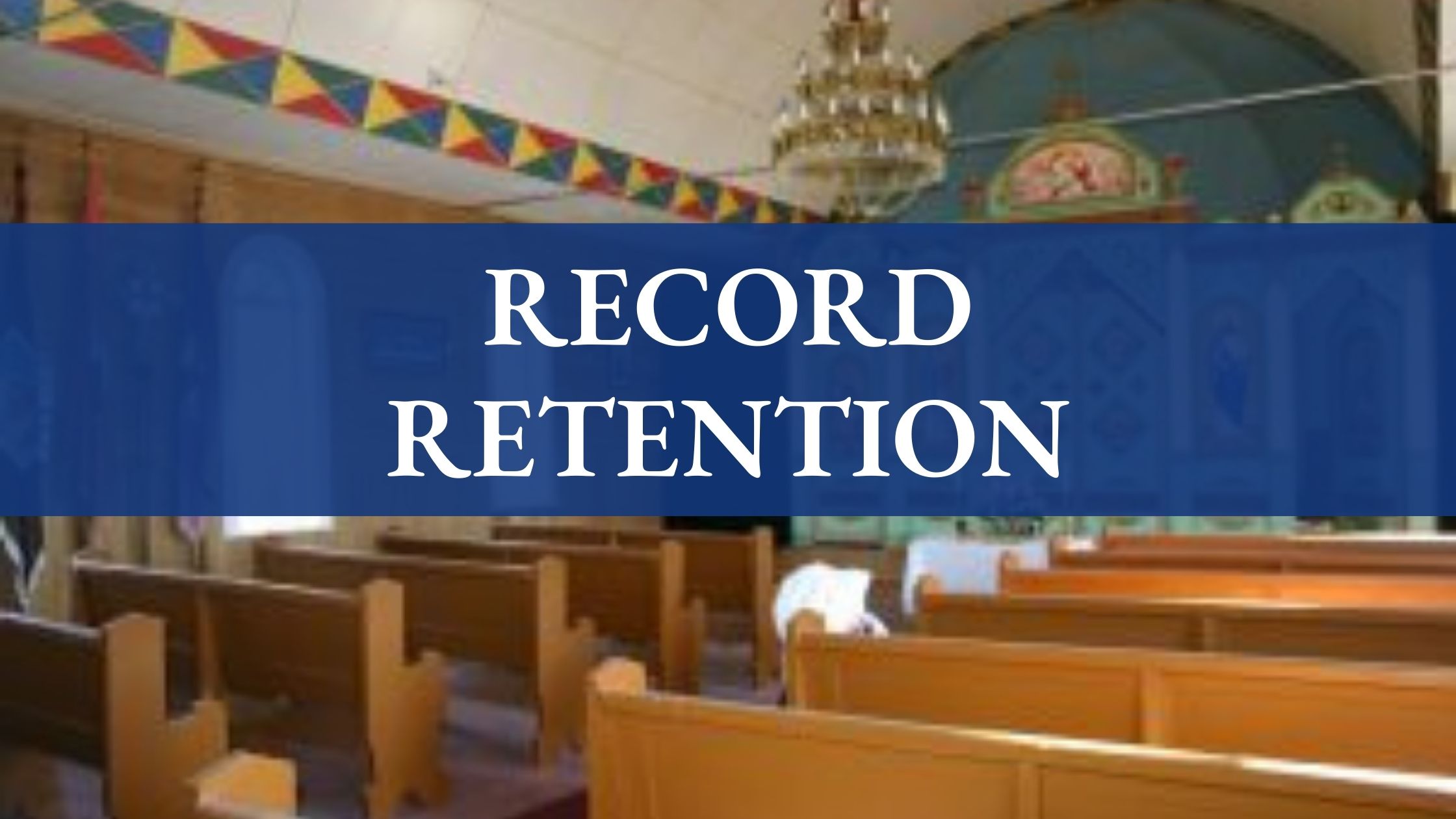What is Record Retention?
Records retention is a practice by which organizations maintain records for set periods of time, and then employ a system of actions to either redirect, store or dispose of them. Such records, either prepared by or received by the parish, may include legal, tax or insurance documents and must be stored in a secure place, safe from fire and water damage. Records of a confidential nature must have stored in a locked cabinet accessible only by the pastor or designate.
The Eparchy of Edmonton requires that all parishes keep complete and accurate records. Additionally, all charitable organizations, societies, and not-for-profit organizations are required to do the same in order to remain in good standing with the provincial and federal governments.
What are the Requirements for Storing Critical Documents?
Documents that require a records retention schedule must be kept in the parish office in a fireproof safe if possible. If a parish does not have an office, the records may be stored with the pastor or appropriate designate. Knowledge of where key documents are stored must be made know to the entire pastoral council. With digital storage available on a computer or “in the cloud” should be used to back up these records. Confidential documents stored digitally must only be accessed by improved individuals.
How Long Must Records Be Kept?
Records considered “permanent” and must be kept forever. These include governing documents, minutes of council meetings, certain issued tax receipts, all insurance documents (including all claims and policies), and certain financial documents. Other records need only be kept for three or seven years (typically for Canada Revenue Agency audits). Once the retention period has ended, these documents must be shredded, and any stored digital files may be deleted.
The pastor and pastoral councils are responsible for the adhering to the records retention guidelines. Copies of all governing documents (Certificate of Incorporation, parish bylaws, etc.) also must filed with the Eparchy.
Parish Record Retention Schedule
The following list provides the retention periods for the most common records produced and maintained by parishes. This list is based on a document published in the Canadian Centre for Christian Charities in 2005 and is accepted current practice by the Canada Revenue Agency.
Records Retention Schedule for Parishes
| TYPE OF RECORD
|
RETENTION
PERIOD |
CONFIDENTIAL |
| Federal/Provincial Documents/Tax Receipts
|
||
| Governing documents (Certificate of Incorporation, bylaws, etc.) | Permanent | No |
| Official receipts for Income Tax purposes (donation receipts) | 3 years | Yes |
| Donations Records (ledger by donor) | 3 years | Yes |
| Church Envelope Records | 3 years | Yes |
| Donation receipts for Income Tax purposes (Perpetual Endowment Gifts) | Permanent | Yes |
| Donation receipts for Income Tax purposes (10-year gifts) | Permanent | Yes |
| Parish Pastoral Council
|
||
| Minutes of Parish Pastoral Council meetings | Permanent | No |
| Minutes of Parish Annual General Meeting | Permanent | No |
| Financial Records
|
||
| General ledger | Permanent | No |
| Year-end financial statements | Permanent | No |
| Approved budgets | 7 years | No |
| Financial statement working papers including year-end | 7 years | No |
| Bank reconciliations | 7 years | No |
| Bank statements / cancelled cheques | 7 years | No |
| Invoices / receipts of payment | 7 years | No |
| Inventory records | 7 years | No |
| Expense claims/forms from employees & volunteers | Permanent | No |
| Insurance policies and all insurance claims | Permanent | No |
| Volunteers / Employees
|
||
| Volunteer application forms | Permanent | Yes |
| Employee application forms | Permanent | Yes |
| Employee volunteer screening documents including PIC/VSC, etc. | Permanent | Yes |
| Performance reviews | Permanent | Yes |
| Employee information (time sheets, sick leave, vacation, disciplinary action) | Permanent | Yes |
| T4 Summaries | Permanent | Yes |
| Payroll records, including T4 and Record of Employment (ROE) | 7 years | Yes |
| Safe Environments
|
||
| Abuse allegation documents and reports | Permanent | Yes |
| Abuse case documents and reports | Permanent | Yes |
| Authorization and Consent forms | Permanent | Yes |

